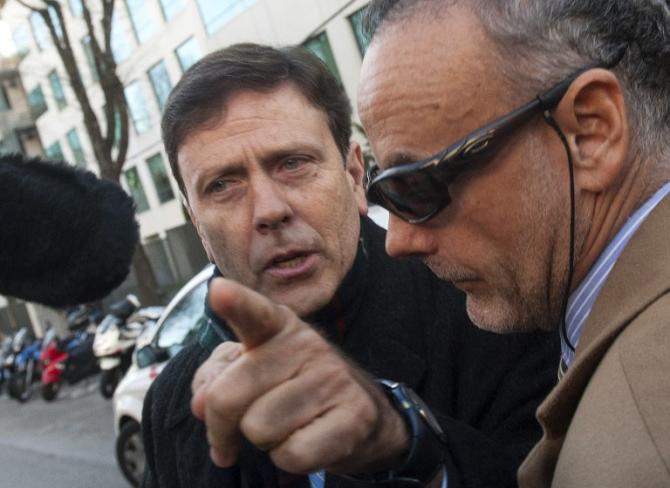Fuentes: we gave transfusions for health reasons
Doctor at centre of Puerto case admits to treating athletes in other sports besides cycling

Eufemiano Fuentes, the doctor at the centre of the Operacion Puerto investigation, took to the stand as the case entered its second day in a Madrid court today (Tuesday). Fuentes, who is one of five defendants facing charges of crimes against public health, spent three-and-a-half hours testifying. Although he admitted providing riders with blood transfusions, he insisted that these were designed to ensure their good health and were not related to doping activities. He also confirmed that he worked with athletes from several other sports besides cycling.
Schleck admits Fuentes payment
Ullrich visited doctor Fuentes 24 times
WADA frustrated by Spanish courts in Operación Puerto case
Fuentes indicted in Spain but out of jail
Reports suggest Fuentes and Saiz will serve time in jail
Playing God: Eufemiano Fuentes
Operación Puerto revived, Fuentes facing jail
Fuentes denies breaking law, but admits giving transfusions
Top riders to testify during Puerto trial
Team Blanco investigate Luis Leon Sanchez's links to Operacion Puerto
The day started with a closed-door session during which the judge, Julia Patricia Santamaría, provided the guidelines for questioning. She refused requests from WADA and CONI, the Italian Olympic Committee, to be allowed access to Fuentes’ computer. However, she agreed that evidence from doping whistle blower Jesús Manzano could be heard and ruled that Tyler Hamilton can appear as a witness in the case.
When he took to the stand, Fuentes presented himself as a medical good Samaritan, who was focused on ensuring that the health of the athletes who consulted him was not compromised. “If an athlete had very viscous blood, we used to extract it to reduce the danger to them. And then we used to freeze it,” he said, the “we” referring to himself and haematologist José Luis Merino Batres, against whom charges have been dropped for health reasons. “If the athlete then came back with low haematocrit or with anaemia, we used to be put the blood back into them for health reasons,” he continued.
Pressed on what athletes were looking for when they contacted him, Fuentes responded: “They wanted a medical assessment, to plan out training programmes, because I am coach, as well as physical testing and medical products… in order to safeguard their health. They used to ask for my services on an individual basis.”
Asked about the degree of secrecy surrounding some consultations and treatments with athletes, he replied: “Sometimes blood was taken in hotels close by because the athlete requested privacy and didn’t want to bump into others at Merino Batres’] laboratory.” Quizzed about why the blood bags were marked with a code and an alias, he said: “They are always shorter than a name and a surname.” He again affirmed that blood transfusions were always given to “normalize” natural blood levels.
Fuentes denied carrying out transfusions during races. Asked about annotations in his files that related to the Liberty Seguros team that seemed to suggest treatments were being carried out during races, he said: “A cyclist or coach was asking me for an expert opinion.” He added: “The papers referring to Liberty are a sporting calendar, simply for planning purposes, they are not a medical plan.” He denied being Liberty’s team doctor.
He did reveal that he had worked with three leading pros, giving the names of Roberto Heras, Unai Osa and Santiago Botero, saying he had provided them with training plans or medical assessments. He admitted that he had worked with “footballers, athletes, cyclists, boxers…” However, he denied having any kind of relationship with former Kelme pro Manzano, whose confessions about blood doping and other doping practices in 2004 were the trigger for the Puerto investigation.
The latest race content, interviews, features, reviews and expert buying guides, direct to your inbox!
When he was asked about the medical products found in his Madrid apartments when they were searched by the Guardia Civil, he insisted that they were for his family’s use. “There was only one box of EPO and that was for my daughter, who had cancer,” he said. Fuentes denied that his sister and fellow defendant Yolanda Fuentes, who is also a doctor, had been involved in the treatments. Asked to explain the fact that when he was arrested he had three mobile phones and eight SIM cards, he stated: “I was really afraid about the press. I never thought about the Guardia Civil.”
Once the state’s prosecuting lawyer had stepped down, the lawyer representing WADA asked a long list of questions relating to Manzano’s confessions in Spanish daily AS in early 2004. Fuentes refused to answer any of the questions.
Peter Cossins has written about professional cycling since 1993 and is a contributing editor to Procycling. He is the author of The Monuments: The Grit and the Glory of Cycling's Greatest One-Day Races (Bloomsbury, March 2014) and has translated Christophe Bassons' autobiography, A Clean Break (Bloomsbury, July 2014).